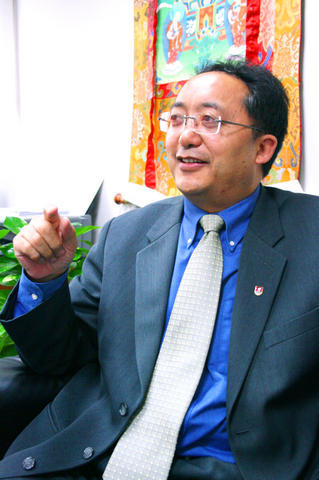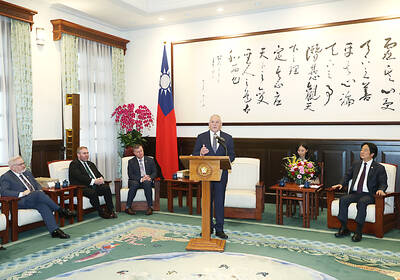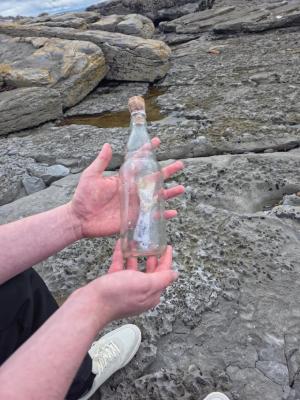Having skipped classes in elementary school to prepare for a trip to Taiwan before he even knew where Taiwan was, Tibetan representative to Taiwan Tsegyam said it was destiny that eventually brought him here.
"I was only 12 or 13 years old at the time; I had no idea where Taiwan was, but I'd heard that Taiwan was a good place," Tsegyam said, recounting his first Taiwan experience in an interview with the Taipei Times.
"So one day, two classmates and I just decided to go to Taiwan, and we began to plan the trip right away," he said.

PHOTO: LOA IOK-SIN, TAIPEI TIMES
At the time, Tsegyam was a third grade student in his native village in China's Sichuan Province.
Although the village administratively belongs to Sichuan Province, Tibetans are the majority as the area was part of Tibet before China's invasion and occupation in 1949.
Soon, the three children assigned themselves tasks -- one was to prepare money for the trip, while Tsegyam and another friend prepared food.
They skipped classes for three days to prepare for the trip, but their plan came to nought after it was uncovered by adults.
After that, Tsegyam said he didn't think about Taiwan again for 30 years.
He grew up to become a history teacher in a Tibetan community in Sichuan.
He later became a political prisoner because of his role in the Tibetan independence movement.
Tsegyam began by teaching his students "real Tibetan history" he learned from Tibetan books published in India, instead of the Chinese Communist Party's (CCP) version.
"I knew [the CCP] was keeping an eye on me, but they didn't take action until some students and I began to post `free Tibet' flyers around town," he said.
He was jailed for more than a year for that. When released, he found himself out of a job and blacklisted by the government.
"I was nearly 30 at the time and knew I had no future in China, so I crossed the Himalayas to join the Tibetans in exile in India," he said.
After spending seven years in India, Tsegyam was appointed representative to Taiwan.
"I was surprised nine years ago when I learned that I was to be assigned to Taiwan. It was like a dream come true," Tsegyam said with a smile on his face. "Destiny eventually brought me here."
Taiwan doesn't recognize the Tibetan government in exile because Taiwan's "Constitution of the Republic of China (ROC)" says that Tibet is part of the ROC.
The Tibetan representative office is formally called the "Tibet Religious Foundation of His Holiness the Dalai Lama," with Tsegyam as its chairman.
"But the entire staff is directly associated with the Tibetan government's Ministry of Foreign Affairs," Tsegyam said, adding that the situation is similar in the other 11 Tibetan representative offices around the world.
The "foundation" was established in 1998 after a historic visit by the Dalai Lama to Taiwan in 1997. Tsegyam arrived as the assistant representative in 1999 and took over as the representative, or chairman, in 2003.
Over the past nine years, he has seen ties between Taiwan and Tibet grow closer.
"The Dalai Lama's visit was actually the beginning of high level government-to-government exchanges between Taiwan and Tibet," Tsegyam said.
"Although the Chinese Nationalist Party [KMT] was in power at the time [the office opened], former President Lee Teng-hui [
After the DPP came to power, "a lot of administrative issues concerning Tibetans that used to be handled by the Mongolian and Tibetan Affairs Commission were handled through the Ministry of Foreign Affairs," Tsegyam said, adding that while in the past, Tibetans in exile were regarded as "mainland residents," they are now considered "stateless."
Other than improvements in Taiwan-Tibetan relationships on the government level, Tsegyam has observed closer ties between the Taiwanese and Tibetan people.
"A lot of non-governmental organizations from Taiwan are helping Tibetans in exile -- that's become more obvious during the past five to six years," he said. "Besides, I've also observed that more Taiwanese are now interested in the Tibetan culture and Tibetan Buddhism."
"I can't predict how the relationship between the Taiwanese and the Tibetan governments will develop in the future, because it will depend on [the presidential] election result," Tsegyam said. "But I'm sure the good relationship between the two peoples will continue for a long time."
When asked about the Tibetan government's reaction to calls to boycott the Beijing Olympics, Tsegyam said the Tibetan government neither objects, nor encourages such calls.
"We know that a lot of Tibetan groups are calling for a boycott, and as a democratic government, we respect their opinions, and would not object to the calls," he said. "We only ask them not to take violent measures."
"The Dalai Lama believes that, through the Olympics, China can be more accepted by the international community, and will be more open," he said.
Tsegyam said the Tibetan government is fully aware that "China hasn't made any improvements in human rights in Tibet, and that there's no religious freedom in China-controlled Tibet. The Olympics is an opportunity for the world to pay closer attention to China and, hopefully, they will discover more about current conditions in Tibet too."
The same idea is behind the Dalai Lama's support for full autonomy in Tibet, rather than for independence.
"The Dalai Lama never said that he would give up independence [for Tibet]," he said. "In fact, [independence] would be most Tibetans' choice if there was one."
However, the Dalai Lama realizes that independence is impossible at the moment and has compromised for the time being, Tsegyam said.
"Tibetan culture, religion and civilization are now at a critical point. They may soon become extinct if we don't take measures to protect them. Hence, as independence can't be reached for now, Tibetan culture may well be dead before Tibet gains independence," he said.
Next month, Tsegyam will leave Taiwan to take the position of secretary-general of the Dalai Lama's office in Dharamshala, India.
"I've lived in India for seven years, and Taiwan for nine years -- so Taiwan is really my second home," he said. "I've really enjoyed living here -- there are friendly people, a relaxed dining culture, and a truly free and democratic society -- I will certainly miss it here."

FINAL COUNTDOWN: About 50,000 attended a pro-recall rally yesterday, while the KMT and the TPP plan to rally against the recall votes today Democracy activists, together with arts and education representatives, yesterday organized a motorcade, while thousands gathered on Ketagalan Boulevard in Taipei in the evening in support of tomorrow’s recall votes. Recall votes for 24 Chinese Nationalist Party (KMT) lawmakers and suspended Hsinchu City mayor Ann Kao (高虹安) are to be held tomorrow, while recall votes for seven other KMT lawmakers are scheduled for Aug. 23. The afternoon motorcade was led by the Spring Breeze Culture and Arts Foundation, the Tyzen Hsiao Foundation and the Friends of Lee Teng-hui Association, and was joined by delegates from the Taiwan Statebuilding Party and the Taiwan Solidarity

‘NON-RED’: Taiwan and Ireland should work together to foster a values-driven, democratic economic system, leveraging their complementary industries, Lai said President William Lai (賴清德) yesterday expressed hopes for closer ties between Taiwan and Ireland, and that both countries could collaborate to create a values-driven, democracy-centered economic system. He made the remarks while meeting with an Irish cross-party parliamentary delegation visiting Taiwan. The delegation, led by John McGuinness, deputy speaker of the Irish house of representatives, known as the Dail, includes Irish lawmakers Malcolm Byrne, Barry Ward, Ken O’Flynn and Teresa Costello. McGuinness, who chairs the Ireland-Taiwan Parliamentary Friendship Association, is a friend of Taiwan, and under his leadership, the association’s influence has grown over the past few years, Lai said. Ireland is

Instead of threatening tariffs on Taiwan-made chips, the US should try to reinforce cooperation with Taiwan on semiconductor development to take on challenges from the People’s Republic of China (PRC), a Taiwanese think tank said. The administration of US President Donald Trump has threatened to impose across-the-board import duties of 32 percent on Taiwan-made goods and levy a separate tariff on semiconductors, which Taiwan is hoping to avoid. The Research Institute for Democracy, Society, and Emerging Technology (DSET), a National Science and Technology Council think tank, said that US efforts should focus on containing China’s semiconductor rise rather than impairing Taiwan. “Without

An SOS message in a bottle has been found in Ireland that is believed to have come from the Taiwanese captain of fishing vessel Yong Yu Sing No. 18 (永裕興18號), who has been missing without a trace for over four years, along with nine Indonesian crew members. The vessel, registered to Suao (蘇澳), went missing near Hawaii on Dec. 30, 2020. The ship has since been recovered, but the 10 crew members have never been found. The captain, surnamed Lee (李), is believed to have signed the note with his name. A post appeared on Reddit on Tuesday after a man